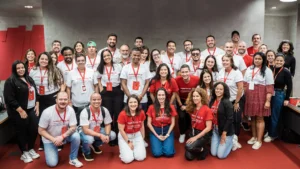Those who complete higher education have a good chance of getting a job, with a salary above the national average income, as soon as they receive their diploma. In the area of technology or engineering, this chance is even greater (and so is the salary), according to first edition of the ABMES/Employability Simplicity Indicator (IASE), a study carried out by the Brazilian Association of Higher Education Supporters with 1,989 recent graduates from 10 institutions in the first quarter of 2022.
Research shows that 7 in 10 students fresh out of higher education get a job between 9 and 15 months after graduation. In the area of Computing, the rate is higher: 8 out of 10 graduates (82%) are employed during this period.
Having a higher education diploma also indicates a better salary compared to Brazilian average, which is R$ 2,548, and with the minimum wage, which is worth R$ 1,212 in 2022.
A recent graduate earns R$ 3,799 per month, on average, but this amount can exceed R$ 5,000, depending on the course. Those who graduate in Computing earn the best salaries: R$ 5,269, on average.
Higher salaries
Computing – R$ 5,269
Hospitality – R$ 4,550
Engineering – R$ 4,477
Health – R$ 3,913
Communication – R$ 3.715
Law – R$ 3,687
Business – R$ 3,325
Education – R$ 2,733
Humanities – R$ 2,643
Engineering performs well
The Engineering area also stands out in terms of employability and income. Among students who have just graduated, 77% are employed (second best number) and earning around R$ 4,400 salary (third best average).
Almost everyone who graduates in Engineering (93%) ends up working in this. Former students of Health courses come in second place, with 85%. The IT area rounds out the top 3 with 77%. But it is interesting to note that, despite the known professional deficit in the area and of more attractive salaries, almost a quarter of IT graduates (23%) said they did not work with what they had just studied.
The areas of knowledge with the lowest match with jobs were humanities (30% work with what they studied) and hospitality (20%).
In-person teaching x distance learning
The research also reveals a difference in income between those who took in-person and distance learning courses. Although both modalities have the same general employability rate (69%), the average salary of those who left home to study was slightly higher — R$ 3,907, compared to R$ 3,564 for former distance learning students.
But, as the newspaper Valor Econômico notes, when Medicine and Engineering courses (in most cases, face-to-face) are excluded from this analysis, the average salary between the two teaching modalities is the same.


